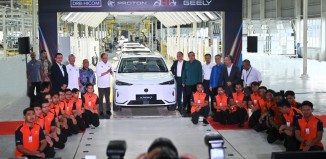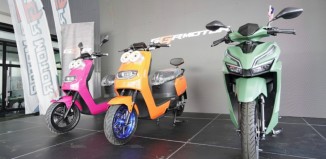Kia Niro EV Launched In Malaysia; Price Starts From RM256k
The all-new Kia Niro EV has been launched by Dinamikjaya Motors Sdn Bhd, adding another battery electric vehicle (BEV) to the Kia portfolio in Malaysia. This 2nd generation Niro is one of Kia’s models in its quest to be a leading global sustainable mobility solutions provider.
The Kia Niro EV is powered by a 64.8 kWh lithium-ion battery pack and offers 150 kW (201 hp) and 255 Nm of torque. Its official 0 to 100 km/h sprint time is 7.8 seconds while top speed is limited to 167 km/h. The battery pack enables a driving distance of up to 460 kilometres* on a single charge. Using DC rapid charging, the battery needs about 43 minutes to get from 10% to 80% SoC (state of charge). AC (alternating current) charging will naturally take longer. It also has a Smart Regeneration braking system which allows you to choose from a series of regeneration levels to slow the car down and recuperate the kinetic energy to recharge the battery and maximise driving range. This system can calculate the amount of regeneration required using its radar and road gradient information. It also allows the car to produce maximum energy from its brakes while bringing the vehicle to a gentle halt.
An additional convenience feature includes a vehicle-to-load (V2L) functionality which means the car is capable of discharging energy from the battery pack to provide power to operate electronic accessories, supplying up to 3.6 kWh of power.
The Niro EV’s bold and dynamic design is inspired by the brand’s design philosophy of “Opposites United”, specifically from the “Joy for Reason” design pillar which combines emotional and rational points to create vehicles that inspire movement. The design also takes inspiration from nature, with the choice of colours, materials and finishes aimed to achieve a balance between an environmentally responsible approach to mobility, and a future-oriented vision of a passenger car.
The exterior derives cues from Kia’s 2019 HabaNiro concept car, with the front end bearing Kia’s signature “Tiger Face” that extends from the hood to the rugged fender below. The “hearbeat” daytime running lights (DRLs) adds a unique yet contemporary look while the bold skid plate and cladding further enhances the vehicle’s rugged appearance.
Built on the 3rd generation “K” platform (wheelbase of 2,720 mm) that allows for multi-powertrain options, the Niro’s dimensions have grown from its predecessor’s, with a length measuring 4,420 mm, width at 1,825 mm and height at 1,570 mm.
Cabin storage at the rear measures 475 litres with the rear seats up and expands to 1,392 litres with them folded down. Under the bonnet is also an additional 20 litres of storage within the frunk (front trunk). The frunk is however designed primarily for storing the vehicle’s charging cable and Vehicle-to-Load (V2L) adapter.
The Niro’s crossover side profile matches a high-tech two-tone body with a wide Aero C-Pillar which integrates an air curtain to enhance air flow and improve aerodynamics. The Active Air Flap within the grille also contributes to the Niro’s 0.29 drag coefficient (Cd).
Inside, the Niro EV features an eco-friendly interior, offering a fresh interpretation with premium quality materials, textured surfaces and a welcoming feel. The off-centre dashboard curves combine bold horizontal and diagonal lines and complemented by ambient mood lighting in no fewer than 64 colours which can be customised to create your preferred environment.
On the dashboard are 2 10.25″ high-definition display screens that integrate the instrument cluster and infotainment in one panoramic combination. The infotainment system gets Apple Carplay, Android Auto connectivity. Other interior features include a wireless charging pad, 8 speakers, 2-zone climate control, a sunroof, and a variable sized cup holder tray, as well as USB Type C ports.
Kia’s commitment to sustainability means the Niro EV uses a variety of new recycled materials in the cabin. The headlining is made from recycled wallpaper while the seats are made from Bio PU* with Tencel* from eucalyptus leaves. Further, BTX-free paint is used on its door panels to minimise environmental impact and reduce waste.
The front passenger seat is a relaxion seat that can recline to a very comfortable lounging position. The Niro’s seats are upholstered in Black Leatherette. There are also USB-C ports incorporated into the sides of the front seats, while the slim headrests also double as jacket hangers.
Standard safety features in the Kia Niro EV include 8 SRS airbags (front driver & passengers, front side, side, curtain and driver’s knee), Anti-lock Braking System (ABS), Electronic Brake-Force Distribution (EBD), Safe Exit Assist (SEA) system which automatically alerts you when a vehicle is approaching from the rear side within the blind spot, Hill-start Assist Control (HAC), Traction Control System (TCS), ISOFIX child restraint anchor points and Rear Occupant Alert (ROA).
Further, its Advanced Driver Assistance System (ADAS) suite includes High Beam Assist (HBA), Blind-Spot Collision-Avoidance Assist (BCA) and Rear Cross-Traffic Collision Assist (RCCA) which detects oncoming vehicles approaching from either side when reversing out of a tight parking spot. In addition, there are Lane Keeping Assist (LKA), Driver Attention Warning (DAW) and Forward Collision-Avoidance Assist (FCA) with Junction Turning, which provides preventive safety when moving through junctions, as well as Lane Following Assist (LFA) and Smart Cruise Control (SCC). 
The all-new Kia Niro EV is imported from South Korea, with 3 colour options available i.e. Snow White Pearl, Mineral Blue and Cityscape Green. It has a retail price of RM255,888, and comes with a 5-Year Manufacturer Warranty (or 150,000 km whichever comes first). The High Voltage Battery Pack meanwhile is covered for 8 years (or 160,000 km, whichever comes first).
* Driving range according to WLTP (Worldwide Harmonised Light Vehicle Test Procedure) cycle. Driving range may vary depending on road conditions, driving style and temperature.
* Bio PU also known as Bio Polyurethane, reduces carbon emissions and includes plant-based components.
* Tencel is fabric made from sustainably sourced eucalyptus. Tencel fibers are produced from the pulp of eucalyptus wood.














































